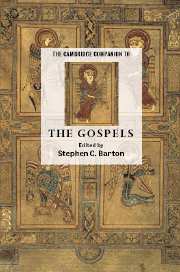Book contents
- Frontmatter
- Introduction
- Part I Approaching the gospels: context and method
- Part II The gospels as witnesses to Christ: content and interpretation
- Part III The afterlife of the gospels: impact on church and society
- 10 The gospels and the development of doctrine
- 11 The gospels embodied: the lives of saints and martyrs
- 12 Praying the gospels: spirituality and worship
- 13 Living the gospels: morality and politics
12 - Praying the gospels: spirituality and worship
from Part III - The afterlife of the gospels: impact on church and society
Published online by Cambridge University Press: 28 January 2007
- Frontmatter
- Introduction
- Part I Approaching the gospels: context and method
- Part II The gospels as witnesses to Christ: content and interpretation
- Part III The afterlife of the gospels: impact on church and society
- 10 The gospels and the development of doctrine
- 11 The gospels embodied: the lives of saints and martyrs
- 12 Praying the gospels: spirituality and worship
- 13 Living the gospels: morality and politics
Summary
Definitions of 'spirituality' are many and various. St Paul distinguishes between two different ways of living: 'according to the flesh' and 'according to the Spirit' (see especially Rom 8). In the light of such a distinction, 'spirituality' may be understood as the whole of life, seen in the perspective of humankind's relationship with God in Christ. It will have a special interest in those enduring realities that are held, in scripture and in the Christian tradition, to be of the essence of what is understood by 'spiritual' - love, peace, forgiveness, reconciliation, wholeness, salvation and so on - and in how those realities are experienced, fostered and articulated. And, since it is concerned with the whole of life, 'spirituality' will be no less interested in other realities - above all, the reality of evil - which may appropriately be described as 'spiritual', and are no less intrinsic to creaturely existence, but which may demand a very different kind of response. On such a view of spirituality, the gospels have an exceptional importance: partly because they have much to say about all those spiritual realities that are accepted as being either constitutive of Christian life or a direct threat to it; partly because they vastly extend our understanding of what 'Christian' means - most obviously by all that they tell us about the life, teaching and significance of Jesus himself. But there is another reason for their exceptional importance: unlike almost all other New Testament texts, they seek to convey truth in the form, not of concept or of doctrine, but of story.
- Type
- Chapter
- Information
- The Cambridge Companion to the Gospels , pp. 245 - 263Publisher: Cambridge University PressPrint publication year: 2006

